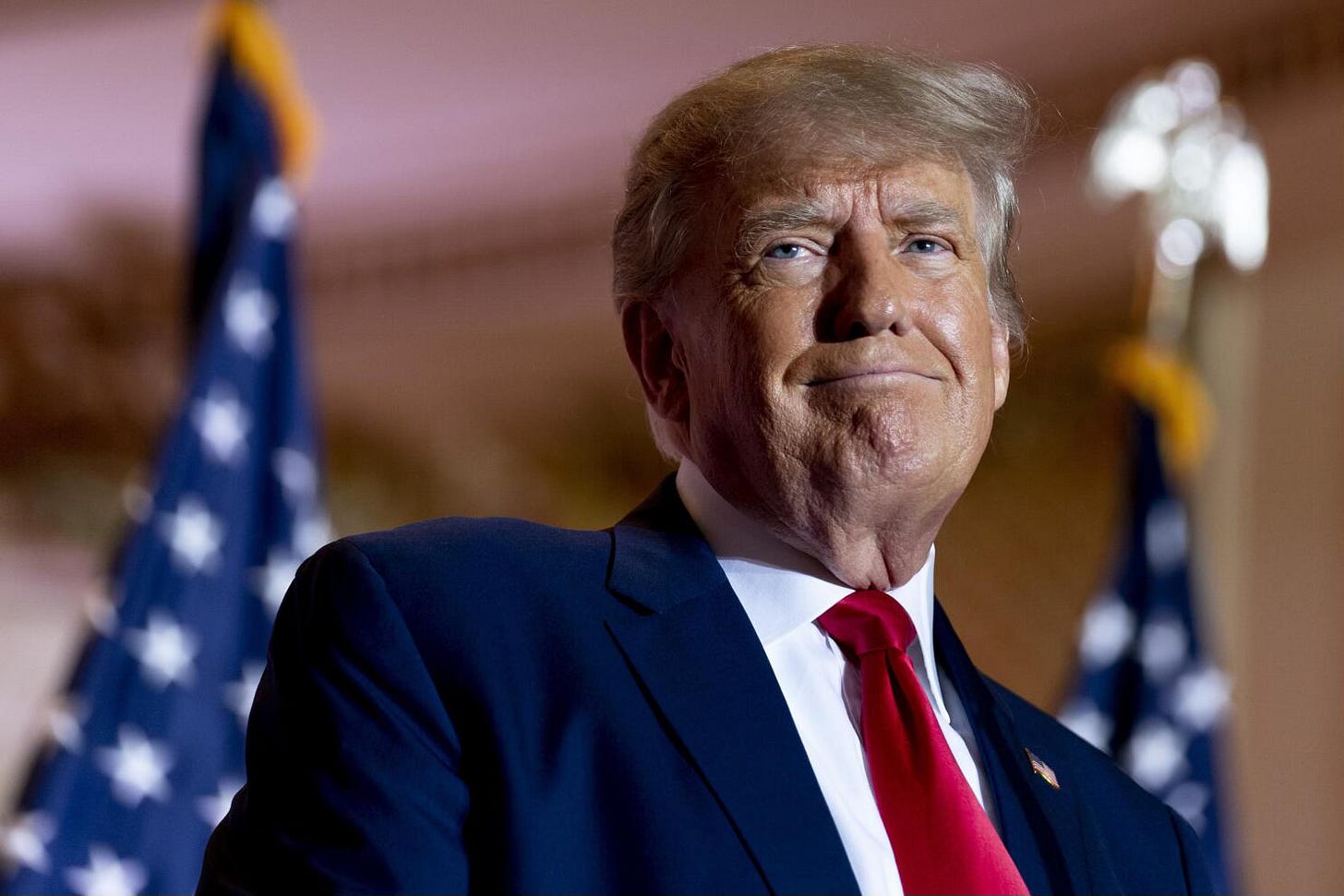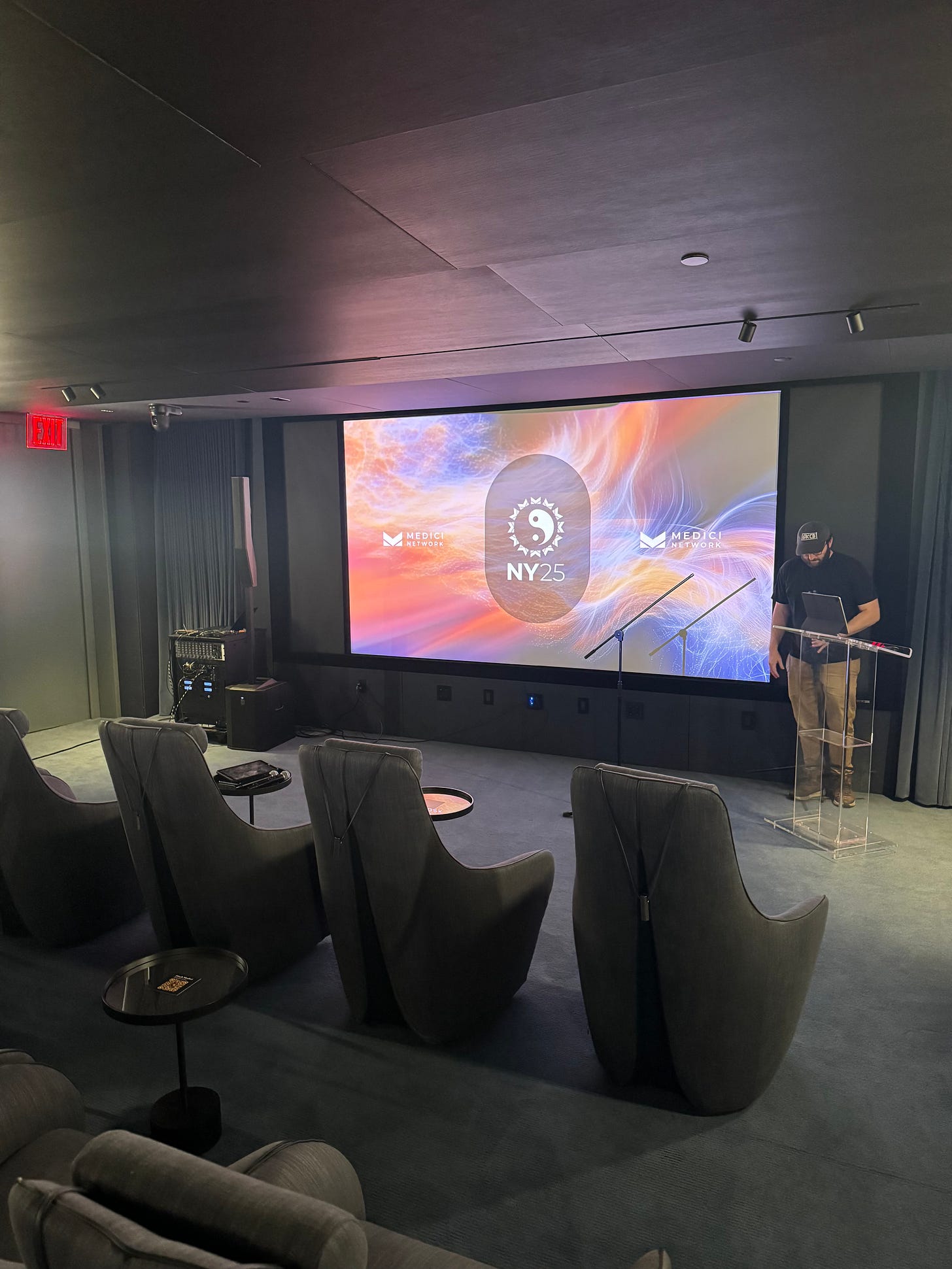Exclusive: From Core Club to Polo Bar, the Medici Crypto Conference Hits NYC
A look inside crypto's most exclusive networking event, bringing together founders and Wall Street's elite
Amid the buzz of last week's annual Blockworks Digital Asset Summit at the Javits Center in New York City, a highly exclusive, crypto power conference took place across town at the Core Club—a swanky, private members' club just feet away from the luxurious St. Regis Hotel on 5th Avenue.
Dubbed Medici NY, the posh affair brought together leading crypto founders and some of Wall Street's top liquid fund managers and firms (think Goldman Sachs, VanEck, and Franklin Templeton) to explore investment opportunities beyond just Bitcoin and Ethereum, and gain insights into the revolutionary projects driving the broader Web3 ecosystem. It also served as a precursor to the larger flagship Medici LA conference, which will take place in Beverly Hills later this year.
The Medici confabs are the brainchild of Adam Winnick, co-founder of the crypto-focused investment firm Finality Capital Partners. Winnick launched Medici LA in 2018 with the goal of helping crypto—then still a relatively nascent industry—gain institutional acceptance.
"I created Medici because I knew that this industry needed help telling its story,” Winnick said. "Blockchain, digital assets, tokens - these are technologies that will profoundly reshape the internet, finance, and society. Medici gives our industry a powerful tool to build allies that can help us accomplish our goals."
To guarantee exposure to the best and brightest minds in finance, Winnick strategically scheduled his event to coincide with the annual Milken Global Conference, a four-day business summit that attracts a who's who of influential figures in global business and politics. The renowned event is hosted by Michael Milken, former Wall Street bond trader and founder of the economic think tank Milken Institute.
Winnick's late father, Gary Winnick, was a former business associate of Milken’s in the 1980’s when they worked together at investment bank Drexel Burnham Lambert making high-yield bonds, or “junk” bonds, more accessible to investors.
When asked why Winnick chose to host his event at the same time as Milken’s, he said, "High yield finance used to be the upstart, now we are. We don't really think we need to take a backseat to anybody. Plus, we serve better food."
Since the first Medici event seven years ago, the crypto industry has come a long way.
The global crypto market cap has surged from approximately $600 billion to just under $3 trillion, with some of the biggest names in institutional finance now involved. Last year, Wall Street made history when eleven firms—including money management giants BlackRock and Fidelity—launched the first exchange-traded funds (ETFs) that tracked the price of Bitcoin. Six months later, some of those firms launched ETFs tracking Ethereum, the second-largest digital asset after Bitcoin.
This occurred despite the Biden administration's broader resistance to the mainstreaming of digital assets, resulting in strict regulations targeting the sector. Former SEC Chairman Gary Gensler spearheaded an industry-wide enforcement crackdown, prompting many crypto firms to relocate offshore to more favorable jurisdictions, while institutions continued to distance themselves from crypto.
Since his re-election in November, pro-crypto president Donald Trump has followed through on his campaign promise to make America "the crypto capital of the planet" by rolling back Biden-era regulations that prevented banks and other institutions from engaging with digital assets. Meanwhile, Congress is working to pass a regulatory framework for digital assets, and the SEC—once considered the crypto industry’s arch nemesis under Gensler—has rescinded most of its enforcement actions and established a dedicated task force to address industry concerns.
The seismic regulatory shift has been a major catalyst, encouraging industry participants to start building again in the U.S., while also attracting institutional players eager to gain exposure to the benefits of the next generation of the internet—Web3.
That's where Medici comes in.
"Years of venture capital investment and now regulatory tailwinds have meaningfully increased the number of tokens in our investment universe,” said Thomas Bailey, founding general partner of Road Capital. "Blockchain native institutional investors like ourselves see a massive opportunity to go beyond Bitcoin, and Medici events provide a great signal that can make it easier to identify quality projects at positive inflection points.”
To showcase some of the space’s leading projects, Medici NY kicked off Wednesday evening with an exclusive hour-long pitch session where select fund managers gathered in a small home-style movie theater setting to hear representatives from five leading blockchain protocols make their investment cases.
The presenting projects, which underwent a rigorous selection process led by Winnick, included the leading interoperability platform Wormhole, modular blockchain network Celestia, Bitcoin DeFi ecosystem CoreDAO, liquid staking protocol Jito Labs, and Mantra, a blockchain designed for the tokenization of real-world assets. After each five-minute pitch, fund managers had the opportunity to ask questions and provide feedback through a post-pitch survey, accessible by scanning a QR code with their phones.
"Adam and his team at Medici put on one of the highest signal events I’ve ever been to in the space, and I've been involved in crypto since 2013," said Rich Rines, initial contributor at CoreDAO, who presented on behalf of the project. "Now, with millions of tokens in existence, there is a 'flight to quality' amongst leading projects, which is both a healthy and natural evolution of the industry. Given that context, we enjoyed the opportunity to build more direct relationships and share Core’s story with the leading allocators in the space."
After the pitch session, a larger networking event with approximately 80 guests took place in the room next to the theater, featuring a buffet, open bar, and a live pianist. It provided potential investors the opportunity to continue their conversations with project founders over cocktails, prime rib, and soft music.
Former North Carolina Congressman Wiley Nickel, a vocal advocate for crypto and its potential to revolutionize finance during his time in Congress, attended Medici NY for the first time.
"At my first Medici, I talked to a number of innovators from interesting startups at the forefront of new blockchain technology," he said. "It was a great opportunity to connect with the key decision makers building for the future of web3."
To conclude Medici's New York leg, a networking brunch was held Thursday morning at Polo Bar, the luxurious restaurant and bar inspired by American fashion designer Ralph Lauren. The cozy eatery, located next to the Core Club, is frequented by Manhattan elites and known for its mahogany walls, leather booths and equestrian-inspired artwork.
"Choosing a setting like the Polo Bar for a networking brunch is not random,” Michael Bressler, founder of crypto consulting firm x2B explained. "Medici understands that the right environment is conducive to creating organic connections amongst people that can move our industry forward.”
The brunch offered an intimate, picturesque setting for attendees to mingle and forge final connections before heading into the hustle and bustle of the Big Apple.









We at the SEC suspect that some of the horses on the walls of the polo club might actually be unregistered securities.